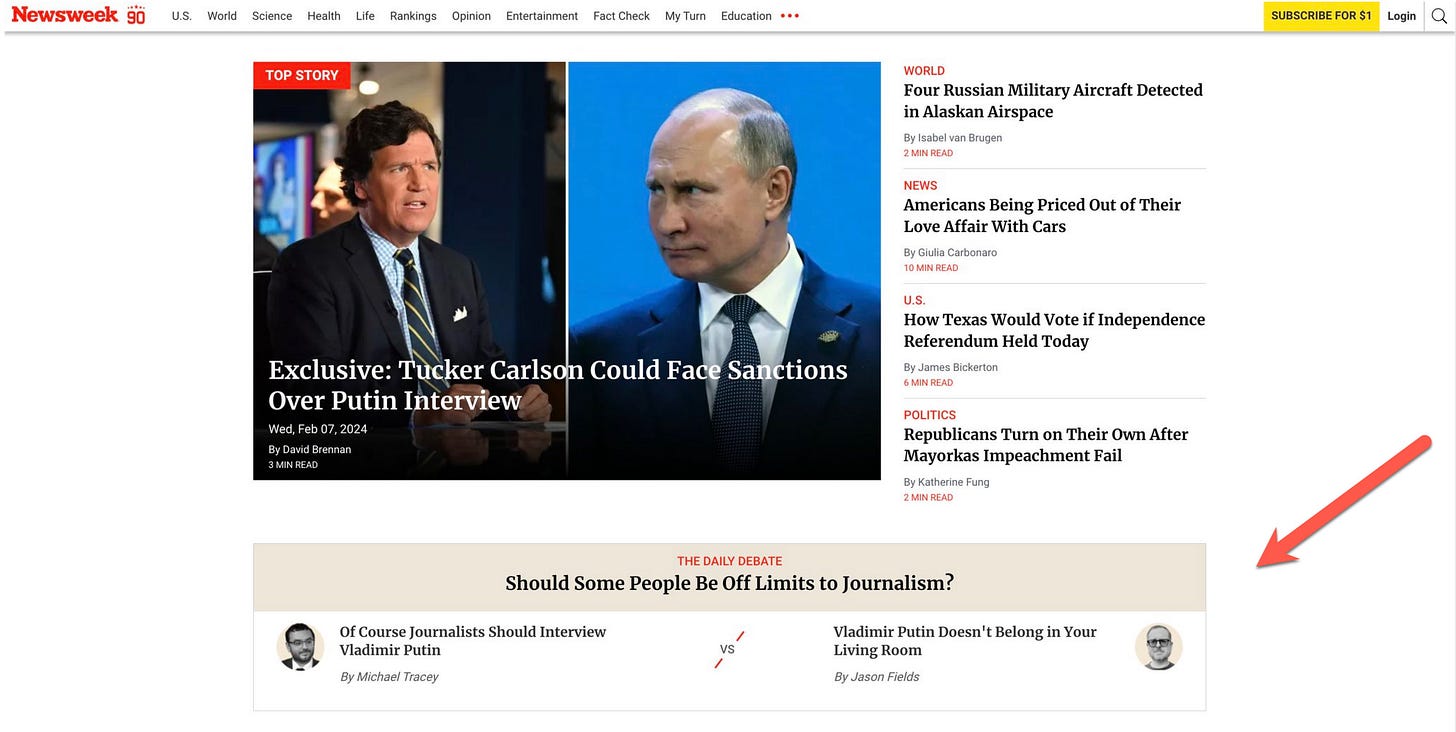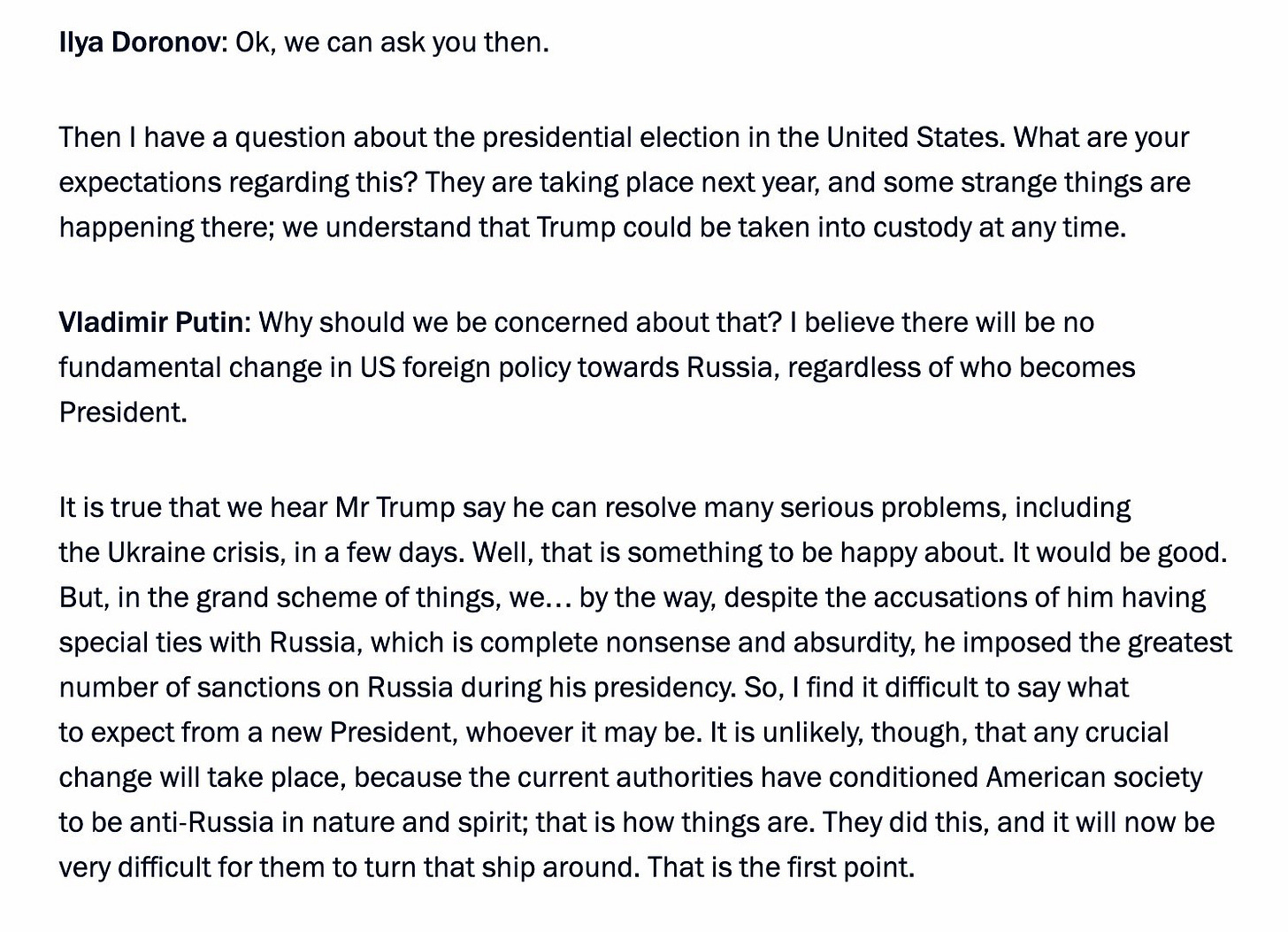Here's the best question to ask Vladimir Putin
Hello, today I am re-launching my Substack. It’s now located at mtracey.net. (The internet gods recently decided that having “Substack” in your URL was no longer permissible in terms of social media visibility.) Regular posting will resume — I have a huge backlog of what I can confidently say is some pretty interesting stuff. I’ll also be contributing semi-regularly to Newsweek, and perhaps some other publications. I’ll probably also add some additional features to the site. Please try to contain your excitement.
Here is the Newsweek article I published yesterday. It’s part of their recurring “Daily Debate” series. I take the position that it should not be “off limits” for journalists to interview major world leaders. Who even knew this was a debatable proposition? Maybe tomorrow we should debate why we’re having a debate about this in the first place.
The other fellow argues that because “Putin already has worshippers on the right — Donald Trump among them — there’s really no point in helping him gather steam with the aid of what is likely to be a sympathetic audience.” Just for laughs, let’s “unpack” some of the premies embedded in this sentence. First, go ahead and stipulate for argument’s sake that there really are Putin “worshippers on the right,” whatever that means exactly, and that interviewing Putin would somehow “help him gather steam” among these hazily-defined individuals. Say that really does happen — although it’s not clear what “gathering steam” means either. My question: so what? Why should the fact of Putin “gathering steam” be the reason not to conduct a journalistic interview with him? This is using some perceived domestic US political consequence — vague antipathy toward the concept of Putin and/or Trump “gathering steam” — as justification for not conducting otherwise newsworthy journalism, which would be manifestly in the public interest. Which reveals that the ultimate journalistic objective of my debate counterpart is not to inform the public, but to regulate their political sentiments in a way he finds most agreeable.
My debate counterpart also casually asserts that Trump himself is one of Putin’s many right-wing “worshippers.” He helpfully includes a hyperlink to back up his assertion. The hyperlink leads to a POLITICO article dated September 17, 2023:
Former President Donald Trump’s plan to end Russia’s war in Ukraine has a telling supporter: Russian President Vladimir Putin. And Trump is welcoming the praise.
“President Putin said, quote, ‘We surely hear that Mr. Trump says he will resolve all burning issues within several days, including the Ukrainian crisis. We cannot help but feel happy about it.’ What do you make of that? Do you welcome this support?” NBC’s Kristen Welker asked Trump during an interview on “Meet the Press.”
“Well, I like that he said that. Because that means what I’m saying is right,” Trump said in the interview that aired Sunday.
Even with just a superficial reading of this text, it would be questionable that Trump is exhibiting a “worshipful” attitude toward Putin. But with a slightly deeper reading, it becomes clear that this is just another example of US media snippeting out an unrepresentative piece of what Putin said, then asking Trump about it, and then turning that into yet another in a long litany of episodes of Trump and Putin supposedly worshipping each other. In the full transcript of Putin’s September 12, 2023 remarks, what he actually says is “there will be no fundamental change in US foreign policy towards Russia, regardless of who becomes president.” Putin refutes the idea that Trump is a special friend of Russia, reminding listeners that Trump “imposed the greatest number of sanctions on Russia during his presidency.” Strange words for mutual “worshippers.”
So basically every clause of my debate counterpart’s sentence above is demonstrably incorrect, but who’s counting.
Anyway, in the Newsweek article I give a brief account of a trip I took in December to Moscow. I thought it timely to make this minor revelation considering Tucker Carlson has been in Russia to interview Putin, and he’s predictably facing idiotic backlash for doing this. So I gave my own rationale for making the trip:
I explained to my hosts that when the opportunity to come to Russia arose, I accepted without hesitation, because bilateral relations between the world's leading nuclear superpowers had perilously deteriorated since the invasion of Ukraine. The grand cosmological treatises articulated by some of the meeting's participants, about how Russia was waging a godly war of civilizational purification, were both wildly over-aggrandized and beside the point, I argued: A giant, man-made calamity was unfolding in real time, and it could always get exponentially worse given the ever-present risks of escalation.
I’ll give more observations from the trip soon enough. While there, I unfortunately did not get the opportunity to interview Putin. But if I did, here’s a fundamental question that I would have asked him — I don’t think I’ve ever heard him seriously address this before.
Putin said the following in his February 24, 2022 speech announcing the invasion of Ukraine: “This was a matter of defending ourselves. We had no other choice.”
Thus, “self-defense” was proclaimed to be a central plank of Russia’s rationale for launching the war. So in the now almost two years that have elapsed, has Russia’s collective “defense” been improved by the war — or worsened by the war?
Let’s examine. Before February 24, 2022, Russian airspace was not being regularly penetrated by long-range bomber drones.
Some notable incidents that have occurred in Russian territory since February 24, 2022:
January 18, 2024: Drone strike hits oil terminal outside St. Petersburg, damaging critical infrastructure
December 30, 2023: Shelling of Belgorod, kills at least 25 people
September 22, 2023: Ukrainian cruise missiles strike Black Sea Fleet headquarters at Sevastopol Naval Base, Crimea
August 23, 2023: Onetime national hero Prigozhin explodes out of the sky
June 23, 2023: Wagner Group launches what Putin would denounce as a "rebellion," seizes military headquarters at Rostov, marches on Moscow
June 1, 2023: Russian border village of Shebekino leveled by heavy shelling and evacuated
May 30, 2023: Drone strikes hit residential areas in Moscow for the first time
May 22, 2023: Ukraine launches first known cross-border ground raids, Russian territory temporarily seized
May 3, 2023: Drone strike on the Kremlin
April 3, 2023: Assassination bombing at St. Petersburg cafe
March 4, 2023: Oil pipeline substation bombed in Belgorod
December 5, 2022: Engels nuclear airbase outside Moscow bombed
October 8, 2022: Crimea bridge attack, damages core transportation infrastructure
August 20, 2022: Assassination car-bombing outside Moscow
April 14, 2022: Russian flagship "Moskva" sunk in the Black Sea
April 1, 2022: Ukrainian attack helicopters breach Russian airspace, bomb Belgorod fuel depot
(This list is by no means comprehensive.)
Before February 2022, Russian village settlements were not being pulverized, mass evacuations were not being carried out, flagships were not being sunk, critical infrastructure was not being damaged or destroyed (including oil refineries, pipelines, bridges, factories, government buildings), Ukrainian operatives were not regularly pulling off dramatic assassinations deep inside Russian territory. Also: 200,000 young Russian men were not dead or wounded (lowball estimate).
Here are the only ways to plausibly argue that Russia’s collective “defense” has improved, rather than worsened, since February 2022:
It’s worse now but things will surely improve later
Despite how terrible it looks, Russia’s collective “defense” actually is being improved because in the long run, Russia will have driven out its primary threat, NATO
Both these arguments rely on speculative projection, and must ignore the actual factual record since February 24, 2022. For one thing, NATO is more integrated with the Ukraine military than ever before, so that alleged goal is trending in the opposite direction. Vastly more US and NATO-provisioned weaponry is parked right now on top of Russia’s border in Ukraine than ever before.
Ukraine has not collapsed in any meaningful sense (military is still plainly extant, state is still plainly extant, of course mostly due to US/NATO “aid” influx.) Europe has not splintered; the EU just dedicated another 50 billion euro to Ukraine. Congress is on track to pass another $60 billion. NATO has expanded, including to hundreds of miles of Russia’s border (Finland), and European countries across the board have increased their military spending.
The final argument that could plausibly be made to support the idea that Russia’s collective “defense” has been improved as a result of the war is that Russia has significantly increased its own military-industrial production capacity, and likely has a bigger artillery reserve than the combined NATO countries.
It’s true that Russia is rapidly converting into a full-blown war economy, with 30% of overall government expenditure dedicated to military spending in the 2024 budget. So the Russian military-industrial sector is doing very well. But when has the prosperity of the military-industrial sector ever been synonymous with “defense”? Often, the concepts are actually antonymous. Military spending has skyrocketed worldwide since 2022, and it’s doubtful that anyone’s “defense” has been legitimately enhanced by this giant surge in global arms production.
Obviously, to ask Putin a question in a live interview setting, you’d have to be a bit more concise. So you’d probably have to just give one or two major examples of Russian domestic “defense” being unambiguously compromised, and then ask how that comports with his statement in February 2022 that the invasion was being launched in the name of self-defense. I think it’s a safe bet that the answer would at least be illuminating.
Sometime in mid-2022, when the “self-defense” argument became more and and more untenable, Russian officials and pro-Russian commentators started to place greater emphasis on grand cosmological arguments for the war: that it was a holy crusade against Western decadence, satanism, sexual deviancy and so forth. Grand cosmological arguments are less possible to empirically undermine than fact-based “self-defense” arguments, so it’s easy to see why the cosmological arguments became more popular when Russian critical infrastructure started to get bombed regularly.
I would hope that Tucker asks Putin something that at least thematically aligns with what I’ve laid out here, but either way, my guess is that his interview will involve substantially less ass-kissing than any average FOX News interview with Donald Trump or MSNBC interview with Joe Biden.





It's nice to see you back.
Delighted to know you've broken free of yet another throttle and we have more of you soon! My only hope is for Tucker to ask about Free Press w Julian Assange, Ed Snowden & Gonzalo Lira.